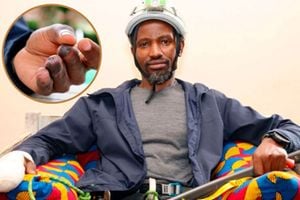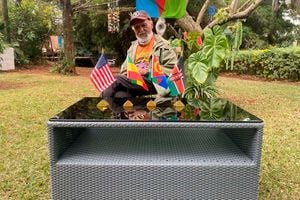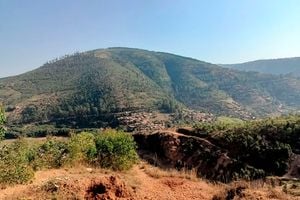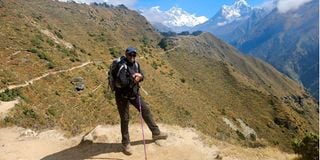
Joyce Gachiri, a 62-year-old hiker at Everest Base on October 20, 2024.
They say that life begins at 40. This maxim is perhaps informed by the generalised sense of settlement that many people will experience in various pillars of life, such as family and career, as they begin their fourth decade.
For Joyce Gachiri, 62, life can begin at any time. She believes that people can start anything they want at whatever age they want to start with resolve, commitment, and consistency.
At the onset of her middle age, she developed an interest in walking as a form of fitness while working in Eritrea with a UN agency. This passion led to a greater passion—hiking. She describes herself as a hiker and is hesitant to be called a mountaineer even though she has planted her feet on peaks few people have attempted—precisely, very high mountains.
At the outset, she didn’t have mountains in mind. “Some of these countries I worked in, I couldn’t walk for security reasons. That meant that whenever I returned home, I looked for time to be out there. Witnessing high-level human suffering can be disturbing. Hiking was my outlet whenever I found time and chance, my way of unwinding. It calms me down,” She recounts.
She, as many people do, after a hike or two, discovered she could hike at higher levels, and she kept adding to her elevation, and soon enough, mountains became her thing.
The ebb and flow of her career and a demanding young family earlier on in her life somehow found a symbiotic relationship.
“I wouldn’t say there is such a thing as an equilibrium, balance or a state of equivalence. What you find out as you live and grow is that, eventually you learn how to handle all the things that come your way. I am lucky that while I was far away from family, I managed to keep in touch with them through regular visits. The nature of the work I did demanded that we take regular breaks and I took mine seriously. I was always travelling home and spending time with my loved ones while sparing time to walk.”
The career humanitarian worker retired early to fully immerse herself in hiking.
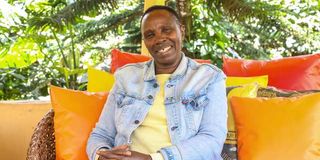
Joyce Gachiri at her home in Karen, Nairobi, on November 28, 2024.
“At my last posting in Gaza, Palestine, I had already decided that I would retire at 60 to be able to do Kilimanjaro before 65. At the time, the retirement age was 65, but I knew if I waited five more years, I would have probably missed Kilimanjaro. So, while I still had the strength I needed to start, 60 looked like a good place to start. I came back home to hike,” says Joyce.
Before she retired, she was accustomed to facing other kinds of mountains. Her whole career has been shaped by working in hardship areas in Kenya, her first posting in Nginyang, in Baringo County. That was back in the late eighties. About 10 years later, she moved to Afghanistan, then Liberia, then to Eritrea, Sri Lanka after the 2004 devastating Tsunami, Iraq, Ethiopia, and lastly, Gaza in Palestine.
“I could say my hiking has drawn lessons from my career. To have that ‘can do’ attitude even in the face of hardship. While working in various places in the world, I never considered giving up, and we could say I have used the same principle in hiking.”
In 2018, four years before she retired, she summited Mt. Longonot. This was a soft launch of the big mountains. Her first big mountain attempt was Kilimanjaro.
“Many people will choose to start with Mt. Kenya and then Kilimanjaro,” She says, “Remember, Kilimanjaro was top of my bucket list in the region, I retired early to attempt Kilimanjaro. Naturally, it was among the first ones I would attempt.”
Not many sexagenarians wake up and go hiking a mountain. She looked around for people who would help her in this audacious dream. It helped that she found a community of hikers that resonated with her pursuit.
“While scrolling the internet one day I chanced upon Gitonga Wandai of Hikemaniak (a Kenyan company that plans expeditions locally and internationally)—through him and the group, I learned of people that hiked professionally.”
If she needed a sign, that timely discovery was it.
One could say that she has built resilience over time. She has been to Rwenzori, Mt. Satima (a couple of times), and several other local hikes, and in October 2024, she flew to Nepal to hike Everest. Her hiking mantra is a simple yet very stark reminder that no one conquers the mountain. Every hiking attempt, according to her, is a conquest against self. Before she starts any hike, she reminds herself that the mountain is not going anywhere. It is a pivotal reference for each time she feels she needs to push herself beyond her limits.
“I always remember that if I can’t do it, I can always go back some other time.”
Before she goes on a hike, she thoroughly prepares by researching.
“I read everything there is to read about the trail I am about to take, I watch videos, and I acquaint myself mentally with the trail before I attempt it. Mental preparation is where you start. You can’t go past what you’ve already visualised and believed.”
Hiking to Everest Base Camp
Her journey to the Everest Base Camp (EBC) started when she was still in Afghanistan circa 2001.
“I went to Nepal on a work-related visit. We were there for a week, and we didn’t get to do a proper tour of the country. I made a promise to myself that one day I would visit the country and take a helicopter tour to see Everest,” She continues.
Her hiking community reminded her of her lifelong bucket list.
“EBC was among the items on my bucket list. Everest is among the international expeditions that the community organises. They reminded me of my long-term desire to visit Nepal and specifically Mt. Everest, except this time I wanted to hike to the base camp and not go up in a chopper.”
By then, she had trained her eyes on a 6,000-plus peak. “Gitonga suggested to me the Lobuche East peak of the Everest Base Camp. He had been to the EBC before and his guidance was reassuring and affirming.
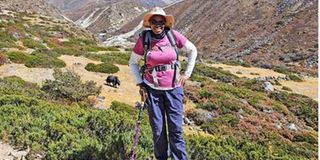
Joyce Gachiri at the Everest Base on October 20, 2024.
Having hiked with him many other mountains, I trusted him with this one. I was determined to get to the peak, but when we got to 5,800m, by body refused. My arms started aching, and I had to signal my guides (Gitonga and a local guide) to turn back. I felt I had already surpassed my expectations, which was the base camp that was now behind us.
Besides, I am not a climber, and what we faced was what I felt was meant to be taken by experienced climbers. All was not lost, though, as I promised the two guides that in 2025, I would go back to Everest and attempt Mera Peak, which is less technical and is more of a trekking trail than a technical climb.”
She has made it a habit to hike a mountain for her birthdays in January. At the time of this interview, she was in the final stages of picking a mountain for her 2025 birthday. She had three options: Mt. Mulanje in Malawi, Mt. Toubkal in Morocco, and the Semien Mountains in Ethiopia.
“I am still debating which of the three I will hike, but Mulanje seems the most tenable.”
The ongoing conflict in Ethiopia and winter in Morocco leaves her with only one choice at the moment; all factors held constant.
When not taking on mountains, you will find her walking around the estate where she lives, sometimes doing up to 30km a day.
“I have learned that if I can’t go to the mountain for whatever reason, I can always walk around where I am. As long as there are trails, and I am healthy, I will walk,” she says.
“All you need to get where I am is consistency and the understanding that hiking is not about speed and competition, I realised that I don’t do well with fast hikes, I hike slowly without having to take rests.”
A key lesson she’d share with people her age who would want to take on this as a challenge?
“The best place to start is first understanding your body. Your body is continuously talking to you. Listen to it. Once you know your body, you will know what activity, what mountain (doesn’t have to be a literal mountain) to take on.”
Being in tune with her body, she says, is her power. “Your body carries you. It is critical that it aligns with your goals and plans. Set your own pace and stick to your lane. Nobody conquers the mountains. The conquest is about self,” she concludes.


